Criscione Lab
I examine fundamental ecological and evolutionary questions in parasite systems and consider my research to be at the interface of ecology, evolution, and genetics. Parasitology provides a rich subject area for studies of ecology and evolutionary biology. Numerous topics such as ecosystem dynamics, mating systems, or coevolution can be addressed because parasites are extremely diverse. By diversity, I include not only the myriad of taxa that have independently evolved a parasitic lifestyle, but also the diversity in life cycles, modes of reproduction, host species, and ecosystems utilized by parasites. This diversity also allows for comparative studies to address theories or unifying principles that span ecosystems or taxonomic groups. Furthermore, there are many practical applications such as studying the evolution of drug resistance, or using parasite community structure to assess “ecosystem health”. My research interests address both basic and applied questions, and span three overlapping subject areas: 1) Genetics and Ecological Genomics, 2) Evolution: Population Genetics, Mating Systems, and Molecular Epidemiology, and 3) Ecology: Biodiversity, Conservation, and Natural History.
Population Genetics, Mating Systems, and Molecular Epidemiology
Little is known about the genetic structure in parasite populations, much less what factors shape these patterns. Genetic structure can influence evolutionary outcomes such as speciation, adaptations to host defenses, and host adaptations to parasite virulence. For parasites of medical, veterinary, or commercial importance, genetic structure has important implications for the evolution of drug resistance and epidemiological models. My research integrates ecological principals in parasitology with population genetics theory to investigate evolutionary mechanisms that affect the genetic variation within and among parasite populations. A practical application that stems from my research is the use of population genetics methods to identify loci of transmission in human parasites (i.e., molecular epidemiology). Elucidation of parasite mating systems (e.g., selfing versus outcrossing) and factors that affect inbreeding in natural populations of parasites are other topics of interest.
Biodiversity, Conservation, and Natural History
The biodiversity and natural history of parasites in many systems remain uncharacterized. This is unfortunate because parasites can constitute a significant proportion of the biomass in an ecosystem, regulate host populations, alter individual host behaviors, and be an important component in food-web chains. Furthermore, many parasites have complex life cycles that require the use of invertebrate and vertebrate hosts. Thus, the presence of a parasite indicates that the required hosts are present in the ecosystem. Such knowledge on parasite community structure can be used to asses “ecosystem health”. A future goal is to establish a biodiversity/conservation research program that incorporates helminth parasite diversity in coastal wetland research around the Gulf of Mexico.
The direct interplay between parasites and their hosts enables reciprocal selective pressures that can shape underlying genetic variation in both parasites and their hosts. We are working to develop high quality reference genomes of the Mediterranean gecko, Hemidactylus turcicus, and one of its parasites, the cyclophyllidean tapeworm Oochoristica javaenesis. These genomic data will serve as the foundation to study the evolution of host immune loci and parasite loci that enable evasion or modulation of host immunity via various approaches: bioinformatics, transcriptomics, phylogenomics, and population genomics. Additional topics of study will include the effects of inbreeding on genome evolution (the tapeworm has high rates of self- and kin-mating), evolution of gene families in both the host and parasite, and genomics of invasive species (both the host and parasite are exotic species in the U.S.A.).
Lab News
November 2023
Congratulations to Jenna Hulke for being selected as a 2023 Phil Gramm Fellow
The Phil Gramm Doctoral Fellowship recognizes scholarly excellence in teaching, research and mentorship.
Jenna received the award from the Dr. Fuhui Tong, Interim Associate Provost and Dean of the Graduate and Professional School.
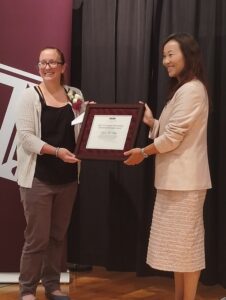
Jenna receiving the award from the Dr. Fuhui Tong, Interim Associate Provost and Dean of the Graduate and Professional School.
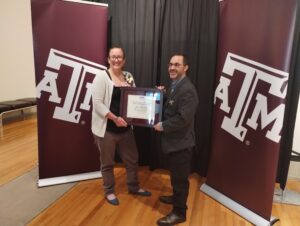
Jenna with her PhD advisor Dr. Charles Criscione.
July 2023
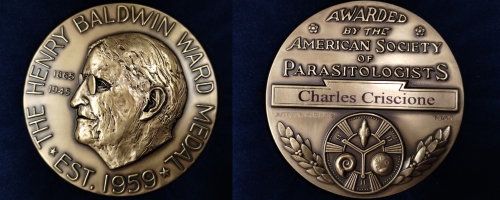
Dr. Charles Criscione was presented with the 2023 Henry Baldwin Ward Medal. His acceptance speech and the medal presentation were given on July 16 at the 98th Annual Meeting of the American Society of Parasitologists in Kansas City, Missouri. The speech will be published in The Journal of Parasitology in December of this year.
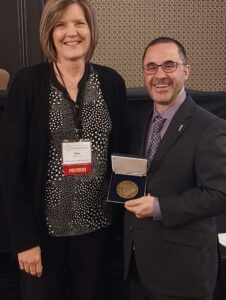
Charles, the 60th recipient of the award since it was first awarded in 1959, is pictured with Dr. Tamara Cook (American Society of Parasitologist President and Professor at Sam Houston State University)
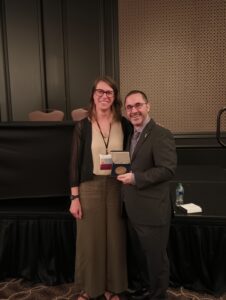
Dr. Jillian Detwiler (former postdoc in the Criscione Lab and now an Associate Professor at University of Manitoba, Canada) nominated Charles for the award.
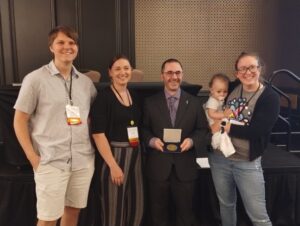
Charles with his current Ph.D. students (from left to right): Ryne Maness, Chelsea Thorn, and Jenna Hulke (holding her son Hugo).
At the meeting, Ryne, Chelsea, and Jenna all gave great talks on their ongoing research in the Criscione Lab.
April 2023
Jenna Hulke has been awarded the Graduate Student Research, Travel, and Professional Development Award from the College of Arts and Sciences to attend and present at Evolution in June.
March 2023
The Criscione lab along with the Verocai lab participated in Darwin Day, or more affectionately known as Dar-worm Day as dubbed by the Verocai lab.

The Criscione lab presented at EIS. Jenna did a talk on the mating system of Alloglossidium renale, while Ryne and Chelsea delivered amazing posters on the mitochondrial genome assemblies of Hemidactylus turcicus and Oochoristica javaensis, respectively. Chelsea won 1st for her poster presentation.
Our lab review, with the assistance of our departmental colleague Dr. Kira Delmore, is now published in the Journal of Helminthology “Population genomics of helminth parasites ”: Publications Page
Dr. Criscione was named Associate Dean in the Graduate and Professional School at Texas A&M
February 2023
Jenna Hulke, Ryne Maness, and Chelsea Thorn presented posters at the Student and Post-doc Research Conference.
Jenna Hulke presented a poster at the interdisciplinary symposium, Life on the Dynamic Planet
November 2022
The Criscione Lab had a recent paper published in the Journal of Parasitology “Trematode clone abundance distributions: an eco-evolutionary link between parasite transmission and parasite mating systems” : Publications Page
August 2022
Dr. Criscione was named Associate Head for Academic Affairs in the Biology Department
July 2022
Dr. Criscione was the Chair of the Local Organizing Committee for the American Society of Parasitologists, and hosted this year’s conference here at Texas A&M University. At the meeting, Dr. Criscione presented his work for quantifying clonal transmission in trematode parasites. PhD student Jenna Hulke presented her work on testing for inbreeding and inbreeding depression in the trematode Alloglossidium renale. New PhD students Chelsea and Ryne presented their M.S. research conducted prior to coming to A&M.
During the conference, ASP hosted the outreach event “Parasitology on the Green”, where various Texas A&M parasitology labs, including the Criscione Lab, provided specimens and activities to teach about parasites to the public. Our lab provided a very spirited game of tapeworm hopscotch.
May 2022
The lab completed about 3 weeks of field work in Georgia, Mississippi, Arkansas, and Louisiana.
January 2022
Ryne Maness and Chelsea Thorn have officially joined the lab. Welcome!
November 2021
Dr. Mary Janecka’s conservation research on the Texas endemic Concho water snake is now published in Conservation Genetics (can provide a web link to the Publications page)
October 2021
Jenna Hulke will be presenting at the Student Postdoc Research Conference hosted by the Biology Department at A&M.
September 2021
Chelsea Thorn and Ryne Maness have joined the lab as PhD rotation students.
Jenna Hulke’s paper “Quantifying bilateral infection patterns in the trematode Alloglossidium renale” was published in the Journal of Parasitology. See the Publications to view the paper.
August 2021
Charles was an invited speaker at Sam Houston State University where he presented some new metrics for quantifying clone transmission in trematode parasites
July 2021
Jenna Hulke presented her study on “Quantifying bilateral infections of parasites” at the virtual meeting of the American Society of Parasitologists.
August 2020
Congratulations to my PhD student Jenna Hulke who passed her prelims!!!
April 2020
My former PhD student, Dr. Mary Janecka, was awarded a NSF Postdoctoral Fellowship for her proposal entitled “Host-parasite coevolution against the current: How do river architecture, unidirectional drift and host behavior shape parasite coevolutionary potential?”
Congratulations!!!
March 2020
Check out our recent publication in PNAS “Clonemate cotransmission supports a role for kin selection in a puppeteer parasite”
See some of the press releases:
https://phys.org/news/2020-03-evolution-life-parasitic-worm-zombie.html
https://www.sciencedaily.com/releases/2020/03/200310164735.htm
June 2019
Our paper on pentastome morphology was recently published in the Journal of Parasitology.
May 2019
Mary Janecka defended her dissertation! Congratulations Dr. Janecka! Mary will be doing a postdoc with Dr. Jessica Stephenson at the University of Pittsburgh.
Jan. 2019
Jenna Hulke joined the lab as a new PhD student. Welcome Jenna! Her research will examine the interface of parasite mating systems and complex life cycles using comparative population genetics.
Dec. 2018
Andrew Sakla completed his M.S.! Congratulations! He will be moving onto a Research Associate Position at UT Southwestern in Dallas
